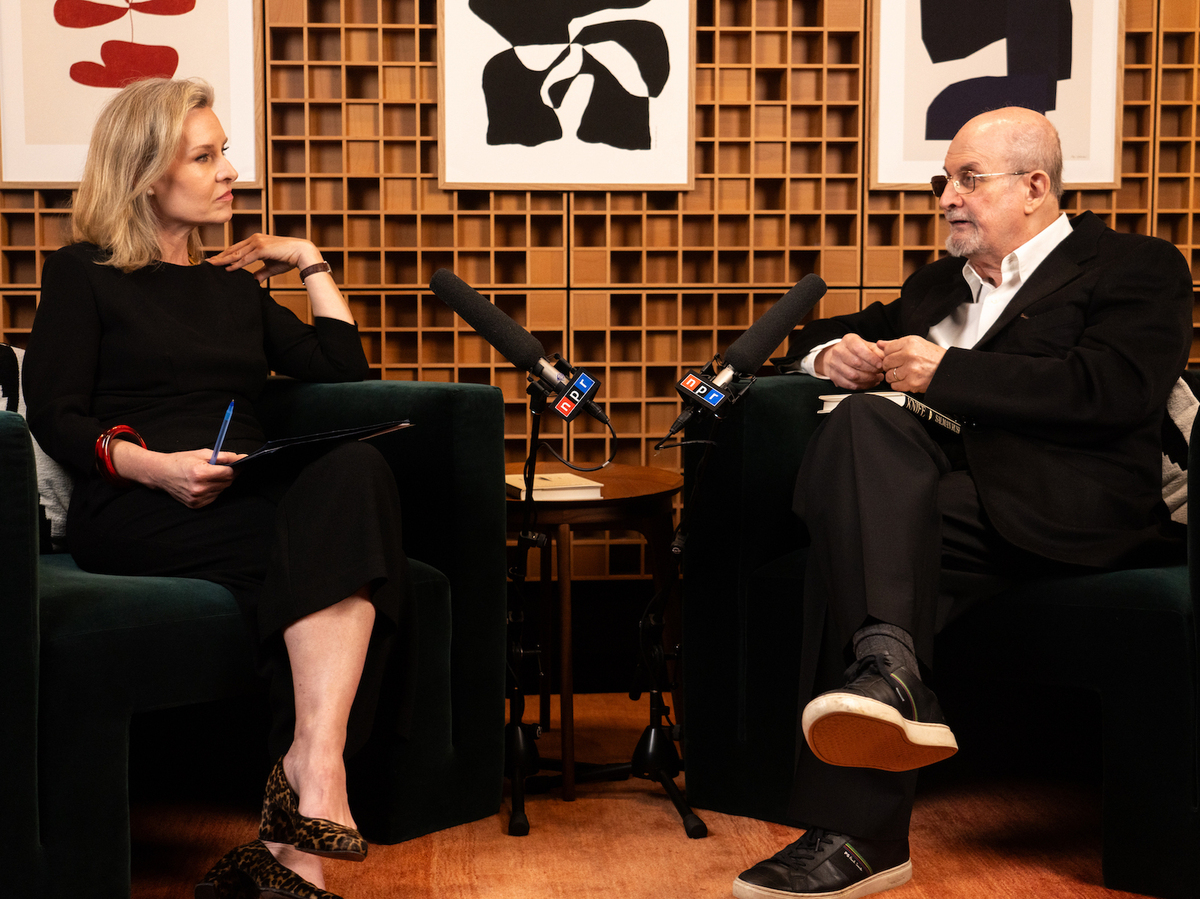Consider this from NPR: NPR

You're reading this newsletter, which reveals one major news story every day. Subscribe here You can hear more messages delivered to your inbox. consider this podcast.
NPR's Mary Louise Kelly speaks with Salman Rushdie (April 8, 2024).
Nicolai Hammer/NPR
hide caption
toggle caption
Nicolai Hammer/NPR

NPR's Mary Louise Kelly speaks with Salman Rushdie (April 8, 2024).
Nicolai Hammer/NPR
1. Career-defining controversy.
Novelist Salman Rushdie won critical acclaim and international recognition with his 1981 title. children of midnight.
But Rushdie is perhaps most closely associated with his 1988 novel. devil's poem A book inspired by the life of Prophet Muhammad. The book was notorious not only for its content but also for its intense backlash. the threat it poses to his safety and well-being.
Rushdie saw this as an exploration of Islamic culture, but some Muslims considered it blasphemous.
In an earlier interview with NPR, Rushdie said, “Ironically, one of the sad things about this whole incident is that this book doesn't just provide literal details of the prophet's life, but actually gives Western readers something to do.'' This means that we might have been able to introduce them.” But different cultures and different ways of seeing affect the spirit. ”
2. Fear and inconceivability.
The year after publication, devil's versethe supreme leader of Iran. issued a fatwa and ordered Muslims to kill Rushdie. For years he was forced to live in hiding with armed guards and even adopted a pseudonym for his writing. But by the turn of the century, Iranian leaders had “called the dogs aside,” he says.
Rushdie moved to New York in 2000 and was able to resume his public life as a popular writer, attending panels and giving speeches, which he considered his new normal. I was able to settle on what I had.
On August 12, 2022, everything changed. A young man charged at Rushdie while he was standing on stage at the event. The man stabbed Rushdie at least a dozen times.
3. Move forward.
The moment he realized what was happening, Rushdie says he experienced a sense of recognition.
”here you are I say something in the book to the effect that he was a time traveler and felt like someone from the past,” he told NPR's Mary Louise Kelly.
Rushdie suffered multiple stab wounds, liver damage and severed nerves in his hands.. He had to be put on a ventilator and lost his left eye.
Two years later, he chronicled his death and its aftermath in a new memoir. knife.
For unsponsored “Think This” episodes, sign up for “Consider This+” on Apple Podcasts or at: plus.npr.org.Please email us at thinkthis@npr.org.
This episode was produced by Megan Lim and Briana Scott. Edited by Courtney Dorning and William Troup. The executive producer is Sami Yenigun.
Summarize this content to 100 words
You're reading this newsletter, which reveals one major news story every day. Subscribe here You can hear more messages delivered to your inbox. consider this podcast.
NPR's Mary Louise Kelly speaks with Salman Rushdie (April 8, 2024).
Nicolai Hammer/NPR
hide caption
toggle caption
Nicolai Hammer/NPR
NPR's Mary Louise Kelly speaks with Salman Rushdie (April 8, 2024).
Nicolai Hammer/NPR
1. Career-defining controversy. Novelist Salman Rushdie won critical acclaim and international recognition with his 1981 title. children of midnight. But Rushdie is perhaps most closely associated with his 1988 novel. devil's poem A book inspired by the life of Prophet Muhammad. The book was notorious not only for its content but also for its intense backlash. the threat it poses to his safety and well-being. Rushdie saw this as an exploration of Islamic culture, but some Muslims considered it blasphemous. In an earlier interview with NPR, Rushdie said, “Ironically, one of the sad things about this whole incident is that this book doesn't just provide literal details of the prophet's life, but actually gives Western readers something to do.'' This means that we might have been able to introduce them.” But different cultures and different ways of seeing affect the spirit. ”
2. Fear and inconceivability. The year after publication, devil's versethe supreme leader of Iran. issued a fatwa and ordered Muslims to kill Rushdie. For years he was forced to live in hiding with armed guards and even adopted a pseudonym for his writing. But by the turn of the century, Iranian leaders had “called the dogs aside,” he says.
Rushdie moved to New York in 2000 and was able to resume his public life as a popular writer, attending panels and giving speeches, which he considered his new normal. I was able to settle on what I had. On August 12, 2022, everything changed. A young man charged at Rushdie while he was standing on stage at the event. The man stabbed Rushdie at least a dozen times. 3. Move forward. The moment he realized what was happening, Rushdie says he experienced a sense of recognition. ”here you are I say something in the book to the effect that he was a time traveler and felt like someone from the past,” he told NPR's Mary Louise Kelly. Rushdie suffered multiple stab wounds, liver damage and severed nerves in his hands.. He had to be put on a ventilator and lost his left eye.
Two years later, he chronicled his death and its aftermath in a new memoir. knife. For unsponsored “Think This” episodes, sign up for “Consider This+” on Apple Podcasts or at: plus.npr.org.Please email us at thinkthis@npr.org. This episode was produced by Megan Lim and Briana Scott. Edited by Courtney Dorning and William Troup. The executive producer is Sami Yenigun.
https://npr.org/2024/04/17/1198911267/salman-rushdie-memoir-knife-interview-near-death Consider this from NPR: NPR





